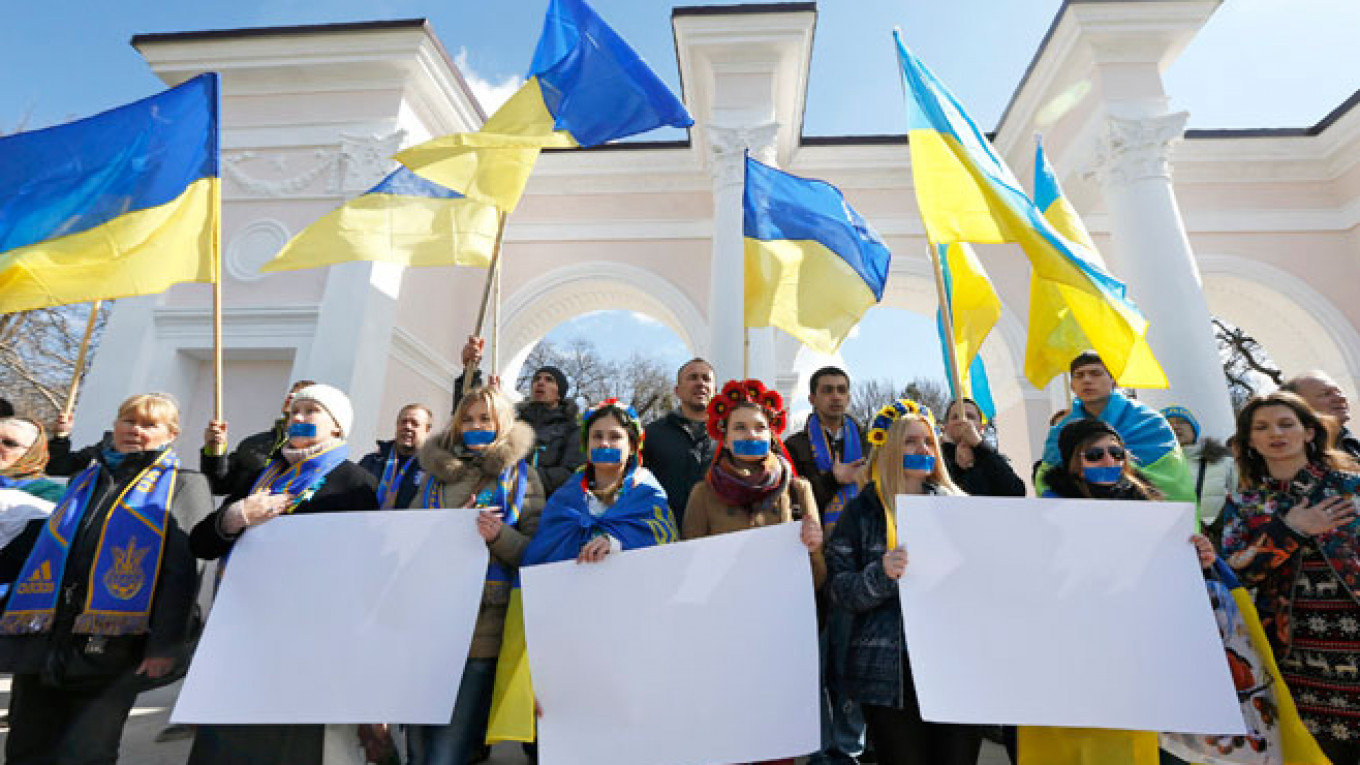As Sunday's referendum in Crimea looms, the West has multiplied its diplomatic efforts to prevent Russia's annexation of the peninsula while preparing sanctions in case Russia does not backtrack.
Talk of sanctions against Russia come amid President Vladimir Putin's efforts to deflect his country's blame for the crisis.
In a meeting with the permanent members of Russia's Security Council on Thursday, which was attended by high-level Russian dignitaries including Prime Minister Dmitry Medvedev, Foreign Minister Sergei Lavrov and Defense Minister Sergei Shoigu, Putin said Russia was not to be blamed for the crisis in Ukraine.
Putin also told national Paralympic association officials in Sochi that Russia was not "an instigator" of the crisis in Crimea and thanked the delegations for keeping the games politics-free.
While Russian authorities have been downplaying blame and anticipating the addition of an 84th federal subject to the country, the U.S. is busy intensifying its eleventh-hour diplomatic efforts to prevent Russia from annexing the Ukrainian republic.
U.S. Secretary of State John Kerry will be meeting with his Russian counterpart Sergei Lavrov in London on Friday at the request of U.S. President Barack Obama to discuss proposals on how to resolve the crisis.
On Thursday, Kerry told a Senate committee that Moscow should expect immediate consequences if it accepts and acts on the upcoming referendum.
"If there is no sign of Russian compromise, there will be a very serious series of steps on Monday in Europe and here," Kerry said in comments carried by The Associated Press.
According to a U.S. State Department press statement, Kerry's meeting with Lavrov, their third in the last two weeks, will serve as a stage to "continue to reaffirm the U.S.' unwavering support for Ukrainian sovereignty, unity, territorial integrity and the right of the Ukrainian people to determine their own future, without outside interference or provocation by Russia."
The meeting follows Obama's exchange with interim Ukrainian Prime Minister Arseny Yatsenyuk at the White House on Wednesday, an encounter that showcased the West's support for the new Ukrainian government.
Despite international consultations on the Crimean referendum, the imminence of Western sanctions on Russia has dispelled hopes of a diplomatic solution.
The leaders of the Group of Seven leading industrial nations published a collective statement on the White House website on Wednesday, warning that they would not recognize the outcome of Crimea's March 16 referedum and would "take further action, individually and collectively" if Russia annexes the Ukrainian republic. The statement also urged Russia to withdraw its troops from the peninsula.
In an address to her party's parliamentarians on Tuesday evening, German Chancellor Angela Merkel said that Russia would "not get away with" annexing Crimea.
Merkel also urged European Union member states to "stick together" to defend European values that she said were threatened by Russia's intervention in Ukraine but insisted that "threads of communication" with Moscow should not be severed.
The EU's arguably modest sanctions on Russia would affect those "responsible for actions which undermine or threaten the territorial integrity, sovereignty and independence of Ukraine." British Prime Minister David Cameron said on Wednesday that European sanctions, which are set to be adopted at the EU foreign ministers' meeting on Monday in Brussels, would apply to Russian parliamentarians who supported the seizure of Crimea.
The European Parliament also passed a resolution Thursday that condemned Russia's military presence in Ukraine and stated that parliamentary relations with the Russian Federation could not "be conducted along the lines of 'business as usual." The U.S. House of Representatives passed a similar nonbinding resolution on Tuesday.
The West's stated allegiance to Ukraine — made tangible by the imposition of sanctions on Russia — will likely materialize in the signature of an association agreement with the EU, the agreement that initially sparked unrest in Ukraine in November and led to the ouster of President Viktor Yanukoyvch.
At a joint news conference in Warsaw on Wednesday, Merkel and Polish Prime Minister Donald Tusk announced that the EU would sign the political portion of its association agreement with Ukraine shortly.
"If there are no technical obstacles, the signing of this [political] part of the association agreement should take place at the next meeting of the European Council, which is next week," Tusk said, Reuters reported.
One of Russia's Deputy Economic Development Ministers, Alexei Likhachev, said Thursday that the ministry was counting on sanctions to be exclusively political, but warned that Russia would consider responding in kind.
"We are ready for any eventuality and are evaluating all options," Likhachev said, Interfax reported. "But we hope that sanctions will be political rather than an obstruction of trade and economic relations."
"Our sanctions will be, of course, symmetrical," he said.
Likhachev's hopes were quickly quashed when the Organization for Economic Cooperation and Development announced Thursday it had discontinued its accession talks with Russia.
Contact the author at g.tetraultfarber@imedia.ru
A Message from The Moscow Times:
Dear readers,
We are facing unprecedented challenges. Russia's Prosecutor General's Office has designated The Moscow Times as an "undesirable" organization, criminalizing our work and putting our staff at risk of prosecution. This follows our earlier unjust labeling as a "foreign agent."
These actions are direct attempts to silence independent journalism in Russia. The authorities claim our work "discredits the decisions of the Russian leadership." We see things differently: we strive to provide accurate, unbiased reporting on Russia.
We, the journalists of The Moscow Times, refuse to be silenced. But to continue our work, we need your help.
Your support, no matter how small, makes a world of difference. If you can, please support us monthly starting from just $2. It's quick to set up, and every contribution makes a significant impact.
By supporting The Moscow Times, you're defending open, independent journalism in the face of repression. Thank you for standing with us.
Remind me later.






